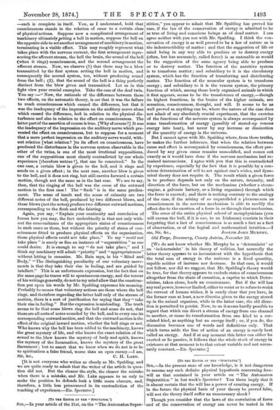ITO TM EDITOR OF TER SPECTATOR.1
Srrt,—In your article of the 21st, on the "The Automaton Super- stition," you appear to admit that Mr. Spalding has proved his case, if the law of the conservation of energy is admitted to be as true of living and conscious beings as of dead matter. I can agree neither with you nor with Mr. Spalding. I think the con- servation of energy is as well proved to be a law of nature as is the indestructibility of matter ; and that the suggestion of life or mind being in any way able to produce or to destroy energy (often, but less accurately, called force) is as untenable as would be the suggestion of the same agency being able to produce or to destroy matter. The function of the nutritive system is to transform matter ; and subsidiary to it is the circulatory system, which has the function of transferring and distributing matter. The function of the muscular system is to transform energy ; and subsidiary to it is the venous system, the primary function of which, among those lowly organised animals in which it first appears, seems to be the transference of energy,—though its highest functions, in the brains of the higher animals, are sensation, consciousness, thought, and wilL It seems to be as well proved as anything can be, where the nature of the case does not admit of any absolutely crucial experiment, that the exercise of the functions of the nervous system is always accompanied by some transformation of energy (possibly of stored-up venous energy into heat), but never by any increase or diminution of the quantity of energy in the universe.
But I cannot agree with Mr. Spalding where, from these truths, he makes the further inference, that when the relation between cause and effect is accompanied by consciousness, the effect pro- duced by any given cause remains unmodified, and comes out exactly as it would have done if the nervous mechanism had re- mained unconscious. I agree with you that this is contradicted by experience, especially by the fact that it is possible by a con- scious determination of will to act against one's wishes, and dyna- mical theory does not require it. The result which a given force is to produce depends not only on the nature, intensity, and direction of the force, but on the mechanism (whether a steam- engine, a galvanic battery, or a living organism) through which the force is exerted ; and there is nothing contrary to the analogy of the case, if the arising of so unparalleled a phenomenon as consciousness in the nervous mechanism is able to modify the effect due to the exertion of a force in or through that mechanism.
The error of the entire physical school of metaphysicians (you will excuse the bull, if it is one, to an Irishman) consists in their forgetting that a fact of consciousness is as much a fact as a fact of observation, or of the logical and mathematical intuition.—I [We do not know whether Mr. Murphy be a ' determinist ' or an 'indeterminist' in his theory of volition, but assuredly the latter theory appears to us inconsistent with the hypothesis that the total sum of energy in the universe is a fixed quantity, capable neither of increase nor decrease. In that case, it would not follow, nor did we suggest, that Mr. Spalding's theory would be true, for that theory appears to exclude states of consciousness altogether from the chain of causation, a caprice to which Deter- minism, taken alone, lends no countenance. But if the will has any real power, however limited, either to resist or to refuse to resist the current of human wishes, it is surely clear that you have, in the former case at least, a new direction given to the energy stored up in the animal organism, while in the latter case, the old direc- tion is permitted to persist. Now, to us it seems hardly possible to regard that which can divert a stream of energy from one channel to another, or cause its transformation from one kind to a cor- related kind, as anything but an energy itself ; or, if you do, the discussion becomes one of word's and definitions only. That which turns aside the line of action of an energy is surely best called an energy. And if at any moment this latter can either be exerted or lie passive, it follows that the whole stock of energy in existence at that moment is to that extent variable and not neces- sarily constant. —En. Spectator.]






































 Previous page
Previous page